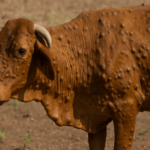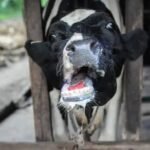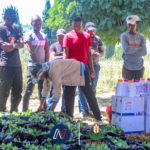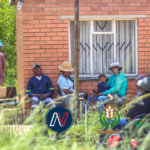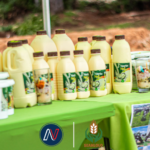Situated in the dusty soils of Ha Mopeli, in Botha-Bothe districts Mochebelele Tlaba is leading a quiet revolution one seed, one row and one harvest at a time.
Tlaba, a soft-spoken yet determined farmer walks his land with a sense of purpose that’s hard to ignore explaining that his land is not just earth to him. “It is possibility.”
“I started farming in 2015 with livestock—sheep, goats, and cattle, but in 2020, I saw something that changed the direction of my work,” he says, with eyes that hold both memory and ambition.
That something was potato farming. Or rather, it was the realisation that chips in the shops, meals in the markets, and food on every plate trace their roots to the humble tuber.
“We noticed a growing demand of potatoes, especially in shops that make chips and other potato-based foods. That’s when we decided to change the cause and saw the possibility of potatoes being our future.” And so, Phokeng Farm was born.
A farm rooted in livestock began to pivot, transforming into a powerhouse of potato production. Starting with 6.8 acres in counting.
These are not ordinary potatoes nor is the production process.
The farm cultivates varieties including Mondial, Panamera, Sifra, and Alison to add value and cater for different needs.
He describes his new formed journey was strengthened by knowledge acquired from reading and training.
Coming from livestock farming, he needed to put in the work to understand how to best win.
“The first step to getting it right is knowing that the potatoes need deeply ploughed and well-harrowed soil. That is the foundation. If the soil isn’t ready, the seeds won’t sing. And the seeds must be clean, disease-free, carefully chosen. A good crop starts with good seed.”
Science agrees. Potatoes thrive in loose, well-drained soils, and healthy seed tubers lead to uniform growth and better yields. But Tlaba isn’t quoting studies, he is living the science, every day with every planted row.
The rows are rain-fed. “We don’t irrigate yet, but we are planning to use drip irrigation soon. That will help us conserve water and be less dependent on rainfall.”
Like many farmers in Lesotho, Tlaba has learned to read the skies, to listen to the wind, and to prepare for the unpredictable hands of climate.
“We face the worst challenges when there’s too much rain or when the heat becomes unbearable,” he explains citing these extremes invite disease and pests, uninvited visitors to the feast.
“We follow weather forecasts and prepare accordingly, and we use hybrid seeds that are more resistant but the battle still rages because of impacts of climate change.”
But the future for Phokeng Farm is not only about survival but described by its expansion.
Tlaba’s dream is to produce potatoes from December through August, creating a near-year-round supply.
“We want to ensure that people who need potatoes always find them. We are striving towards steady production, steady income, and steady possibility that Lesotho is able.”
“We also plan to introduce calibrated planters and potato harvesters to ease the work and even help others,” he explains, with excitement.
“Right now, harvesting with a cow-drawn plough causes great losses because some potatoes get damaged in the process. Machinery will help reduce waste and improve efficiency.”
Speaking about the imminent challenge of inputs, Tlaba says they are looking into producing their own seed of high-quality, resilient seed that will unlock even higher yields.
“We produce about 12 tonnes of table potatoes each year which are sold to Basotho at low prices, so our people can access food they can afford,” he says noting that his farm compensate its employees not only with money but with potato hampers too.
“We also offer free training on production, nutrition, and harvesting to people interested in learning, and this is all thanks to extension officers and other successful farmers who support us.”
For Tlaba, vigilance is key, “A farmer must be alert at every stage, from seed selection, soil preparation, nutrition, protection, post-harvest handling and marketing.”

